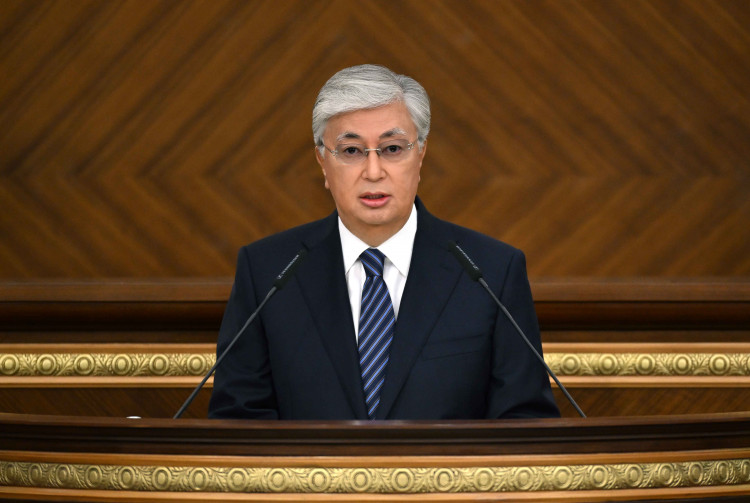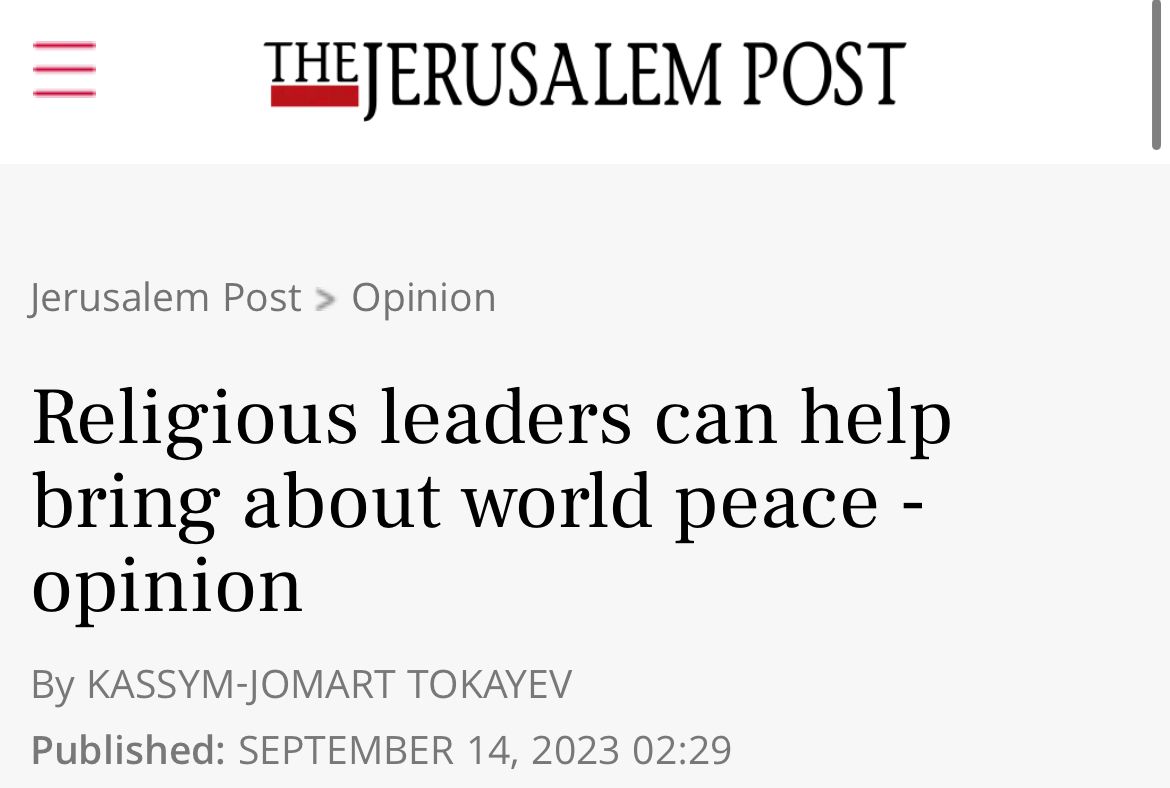ASTANA — The Jerusalem Post published an opinion piece by President Kassym-Jomart Tokayev on Sept. 14, where he reiterated the indispensable role of religious leaders and the need for a new global movement for peace to build a new international security system.

Photo credit: Akorda.
Tokayev wrote that faith plays a significant factor in people’s lives, with 85% of the world’s population identifying with some form of religion. According to him, the sacred value of human life, mutual support, and the rejection of destructive rivalry and hostility are principles shared by all religions, and they can serve as the basis of a new world system.
The President also underscored the role of diplomacy in facilitating cooperation. He highlighted Kazakhstan’s approach to solving disputes by negotiations following the United Nations (UN) Charter. However, Tokayev notes that “despite best efforts, conflicts remain ubiquitous in many parts of the world.” The world, according to him, is witnessing “rising international tensions and erosion of the global order that has been in place since the establishment of the UN.”
“Divisive blocs, which have not been seen since the Cold War, are making a swift return,” he wrote.
According to Tokayev, the planet is facing severe threats, including a new global arms race, the threat of nuclear weapons, and the proliferation of wars in all formats, including hot, hybrid, cyber, and trade.

The President wrote that the role of religious leaders “to heal the wounds of hatred following an enduring conflict” is important, presenting Syria as a case in point.
“Kazakhstan welcomes the fact that hostilities have all but ended in that country. We are glad to have contributed to this through the Astana Process peace talks, which since 2017, facilitated negotiations between representatives of the Syrian government, the opposition, as well as Türkiye, Iran, and Russia. Yet, while the hot phase of the conflict is over, the divisions within the country remain. Spiritual leaders can play an important role in healing Syrian society through the power of religion,” he wrote.
The President noted that, unfortunately, due to the contradictory nature of humans, provocations and hatred will remain a part of the human experience. According to him, recent actions to burn the holy Quran in some northern European countries undermine the culture of tolerance, mutual respect, and peaceful coexistence.
“In this regard, the targeted communication of religious leaders in preventing such situations and trends is crucial,” he wrote.
Kazakh President also drew attention to the impact of the new technologies on different spheres of human life. While improving such areas as healthcare, access to information, and communication and travel, digital technologies fragment and polarize communities.
“In the new digital reality, it is also necessary to cultivate spiritual values and moral guidelines. Religion has a key role to play here, too, as all faiths are based on humanistic ideals, recognition of the supreme value of human life, and the aspiration for peace and creation,” he wrote.
Tokayev underscored that such principles should be applied also in the socioeconomic development of countries and international politics. According to him, if such principles are ignored, “the rapid scientific-technological revolution can lead humanity astray.”
Tokayev shared another Kazakhstan’s initiative – the triennial Congress of Religious Leaders – which for the past two decades has been encouraging interfaith dialogue.
“Established in 2003 in direct response to the rise in interfaith disagreements and extremism following the 9/11 terrorist attack in the United States, the Congress has strengthened interfaith dialogue by bringing together religious leaders,” he wrote.
Tokayev appreciated the joint efforts of the Congress’ participants in promoting tolerance and mutual respect in contrast to hatred and extremism when he was the head of the Congress Secretariat before becoming the Kazakh president in 2019.
“Last year, our country held the Seventh Congress of Religious Leaders. It was attended by delegations from 50 countries, including representatives of Islam, Christianity, Judaism, Shintoism, Buddhism, Zoroastrianism, Hinduism, and other religions. I was honored to welcome Pope Francis, the second visit by the head of the Catholic Church to Kazakhstan following the visit by Pope John Paul II in 2001,” he wrote.
Tokayev reiterated the Congress’ invaluable contribution to Kazakhstan’s success in forging a stable and harmonious society where a population of over 100 ethnic groups and 18 confessions live in peace. According to the President, by committing to religious tolerance and human rights, Kazakhstan sets an example for the world, demonstrating the paramount contribution of interfaith dialogue in creating a more peaceful and harmonious global society.
“As the world continues to be embroiled in political uncertainty, a bridge of rapprochement between cultures and civilizations is required more than ever. I am determined to ensure that Kazakhstan facilitates global dialogue between religions and nations, including through the work of the Congress of Religious Leaders, thus contributing to mutual understanding and respect in societies,” he concluded.
